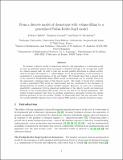From a discrete model of chemotaxis with volume-filling to a generalized Patlak–Keller–Segel model
Abstract
We present a discrete model of chemotaxis whereby cells responding to a chemoattractant are seen as individual agents whose movement is described through a set of rules that result in a biased random walk. In order to take into account possible alterations in cellular motility observed at high cell densities (i.e. volume-filling), we let the probabilities of cell movement be modulated by a decaying function of the cell density. We formally show that a general form of the celebrated Patlak–Keller–Segel (PKS) model of chemotaxis can be formally derived as the appropriate continuum limit of this discrete model. The family of steady-state solutions of such a generalized PKS model are characterized and the conditions for the emergence of spatial patterns are studied via linear stability analysis. Moreover, we carry out a systematic quantitative comparison between numerical simulations of the discrete model and numerical solutions of the corresponding PKS model, both in one and in two spatial dimensions. The results obtained indicate that there is excellent quantitative agreement between the spatial patterns produced by the two models. Finally, we numerically show that the outcomes of the two models faithfully replicate those of the classical PKS model in a suitable asymptotic regime.
Citation
Bubba , F , Lorenzi , T & Macfarlane , F R 2020 , ' From a discrete model of chemotaxis with volume-filling to a generalized Patlak–Keller–Segel model ' , Proceedings of the Royal Society A: Mathematical, Physical and Engineering Sciences , vol. 476 , no. 2237 , 20190871 . https://doi.org/10.1098/rspa.2019.0871
Publication
Proceedings of the Royal Society A: Mathematical, Physical and Engineering Sciences
Status
Peer reviewed
ISSN
1364-5021Type
Journal article
Description
Funding: The authors gratefully acknowledge support of the project PICS-CNRS no. 07688. F.B. acknowledges funding from the European Research Council (ERC, grant agreement No. 740623) and the Université Franco-Italienne.Collections
Items in the St Andrews Research Repository are protected by copyright, with all rights reserved, unless otherwise indicated.

